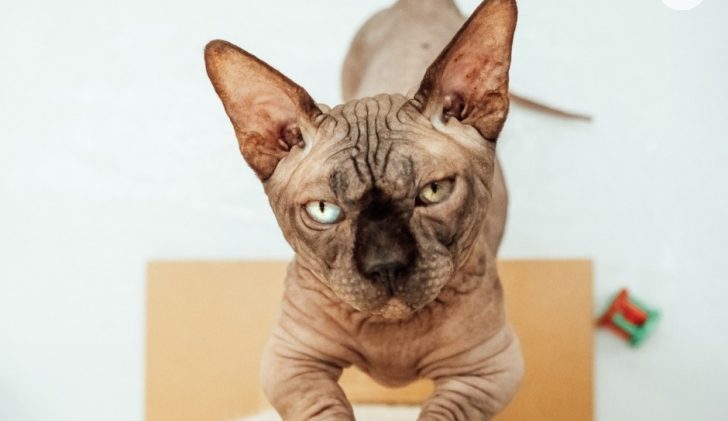Extreme breeding is hurting more than it helps. A rescued cat named Alfred shows how far these trends can go, and his story sheds light on bigger problems in the pet trade. He was found in a box, weak and ill, and now faces permanent challenges.
This cat lacks the protective coat most felines have. Alfred’s bare skin is prone to rashes and temperature swings. He needs careful monitoring, special fabrics, and ointments to avoid injury. Without that natural layer, his body fights to stay balanced day and night.
His tiny legs may look unusual, but they limit how he moves. Each step can strain joints over time. Climbing, jumping, and even walking across uneven ground can cause pain. This makes everyday life harder than most cats experience.
View this post on InstagramA post shared by The Cat & Rabbit Rescue Centre (@catandrabbitrescuecentre)
Alfred also has entropion, where the eyelid folds inward. This scratches the cornea and creates constant irritation. He needs ongoing care, and without it, infections can develop fast.
Whiskers help a cat sense distance and obstacles. Without them, Alfred bumps into furniture and struggles with simple navigation. He relies on caution rather than instinct, slowing him down and making his world feel unpredictable.
Beyond Alfred, new trends push for bulkier, hairless cats nicknamed XL Bully cats. These cats develop severe joint stress and skin infections. Their average life span is far shorter than that of other cats, yet demand grows as photos circulate.
Dwarfism and joint issues mean constant wear and tear. Pain relief, gentle exercise, and vet visits become part of life. These cats never know what it feels like to move without discomfort.

The Cat & Rabbit Rescue Centre / Instagram / Rescuers found Alfred alone outside Portsmouth. He had no warmth, no food, and no clear future.
Climbing cat trees or reaching shelves is nearly impossible. Alfred stays low to the ground, missing out on natural behaviors. Traits like folded ears or hairlessness may sell quickly, but the animals carry genetic risks that never get fixed.
Groups such as the Naturewatch Foundation and the RSPCA want tougher breeding laws. They see rising numbers of sick cats entering shelters. Regulations could prevent the worst practices and protect animals before they suffer.
Rescuers hope fewer cats will face what Alfred endures. Change depends on public awareness and informed choices. Every adoption and every shared story moves the issue closer to a better path.
